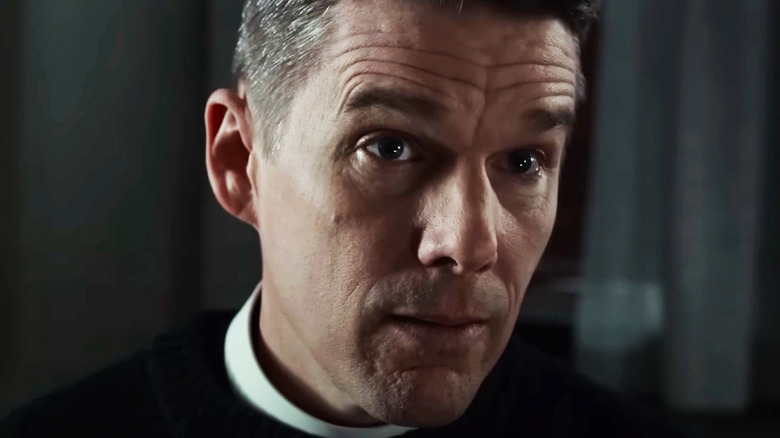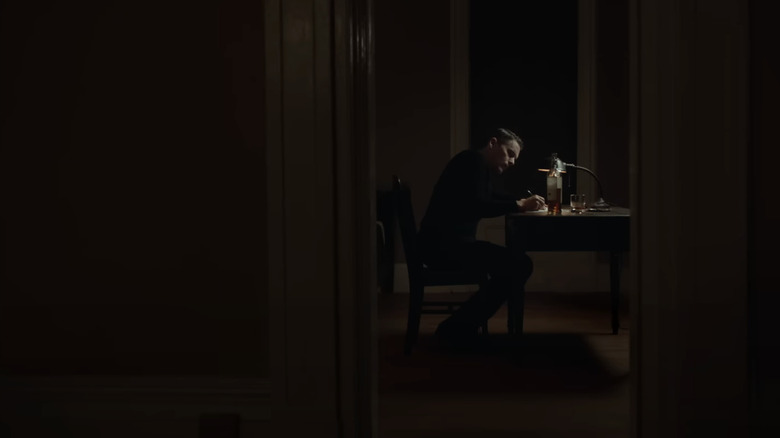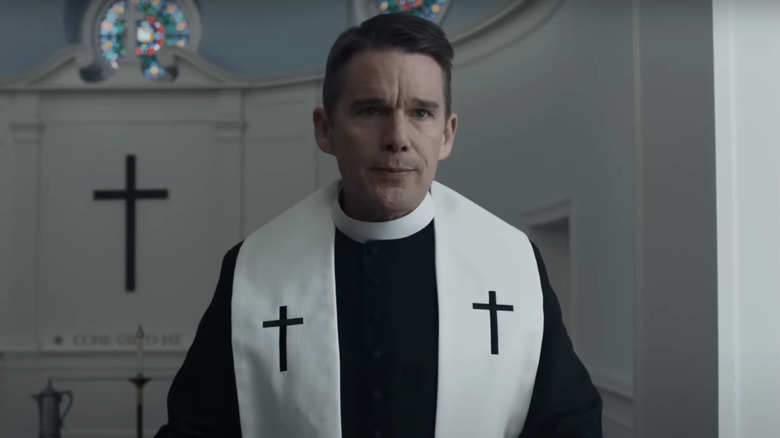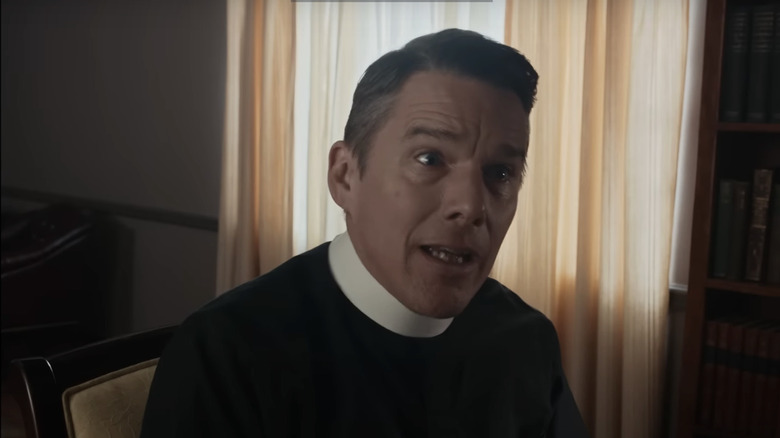Ethan Hawke Had To 'Hypnotize' Himself For His Best Role
If you've ever watched any behind-the-scenes footage from "The Shining," you might remember Jack Nicholson working himself up into a frenzy prior to shooting the famous "Here's Johnny" scene. As poor Shelly Duvall quietly finds her way into the bathroom, Jack can be seen seething as he descends into the deranged mental space required for the scene. No wonder "The Shining" changed Shelly Duvall forever.
But while Nicholson's process for journeying to the outer edges of sanity involved jumping in place, repeating the words, "Come on!," and almost accidentally giving the PA a concussion with a prop axe, not all actors follow that same method. We all know the punishing physical lengths to which Christian Bale goes in order to truly feel like the characters he portrays. As the actor told The Guardian, "I try to get as distant as possible. Otherwise, I can't do it. It's helpful not to look like yourself. If I look in the mirror and go, 'Ah, that doesn't look like me,' that's helpful."
But the physical transformation isn't quite as important as experience for others. When Robert De Niro was gearing up to play Travis Bickle in Martin Scorsese and Paul Schrader's "Taxi Driver," for instance, he made sure to actually get his taxi driving license and operate his own cab in New York City prior to shooting. Of course, Bickle was a much more lonely, restrained kind of crazy than Jack Torrance, but the principle of getting into the right headspace is the same. For Ethan Hawke, who starred in a much more recent entry in Schrader's oeuvre, it seems hypnosis was the key.
First Reformed is one of Hawke and Schrader's best
"First Reformed" is Paul Schrader's 2017 exploration of the limits of faith in the face of grief, and how an increasingly divided and turbulent world can have consequences on an individual's personal sense of well-being. The psychological drama won Schrader, who wrote and directed the film, a Best Original Screenplay Oscar nomination. It also happens to be the film that gave us Ethan Hawke's best role.
Hawke stars as Ernst Toller, a pastor at the First Reformed Church in Snowbridge, New York. The former military chaplain is grappling with the loss of his son, who died while on duty in Iraq after Toller encouraged him to sign up for the military. Things worsen when he's approached to help council Michael Mensana (Philip Ettinger) through a difficult time in his life. The radical environmentalist is convinced the world is on a path to destruction and sees no reason to bring a child into it. His pregnant wife, Mary (Amanda Seyfried) asks Toller for assistance but Michael dies by suicide, worsening Toller's personal turmoil and crisis of faith. As the film continues, we see Toller seemingly lose all sense of meaning, ultimately attempting to end his own life in an emotional, haunting, and surreal climax rendered even more impactful by Hawke and Schrader's prior dedication to hard-hitting realism.
The film earned all sorts of plaudits and remains one of both Schrader and Hawke's best works. But for the star, getting to the core of his character, especially at his most despairing, was not easy, and required an unusual approach.
How Ethan Hawke got into the right mindset for First Reformed
The finale of "First Reformed" is a big moment for Ethan Hawke's character, who has succumbed to his despair, donning an explosive vest he plans to detonate a the 250th anniversary ceremony for his church, before deciding not to go through with it and returning home. There, he pours a tumbler of drain cleaner and appears to be planning to commit suicide, before he's interrupted by Mary and the two embrace. Speaking to Entertainment Weekly, Hawke explained how the final moments of "First Reformed" were the hardest for him to tackle. The actor said:
"Toward the end of the movie, he goes down the deep end of the drain, and when you're forced to press the outer reaches of madness and despair, it's hard to take your mind there because a lot of ways acting is like a guided meditation."
Hawke went on to characterize the process of getting into Ernst Toller's headspace as a form of hypnosis, adding, "You kind of have to hypnotize yourself. If you hypnotize yourself, there's this opportunity for the audience to come along with you. But if you don't hypnotize yourself, they're not going to come." What's more, the "Training Day" star seemed to find it difficult to snap out of his hypnotic trance, saying, "Sometimes it's easier to fly into a flame, but flying out of the flames is hard."
Ethan Hawke isn't the only actor to go into a trance for a role
Not that the harrowing depiction of human despair in "First Reformed" has all that much to do with the box office smash that was 1989's "Batman," but Hawke's comments do faintly recall those of the star of that particular superhero blockbuster, Michael Keaton. The actor previously spoke to the In The Envelope podcast, saying: "I asked [director Tim Burton] to shoot a scene where you see me kind of in the eyes, and you see me kind of go into this weird kind of meditation where I kind of disappear and lose myself in order to be Batman because that's the only way I could rationalize what he was about to go do." Though Hawke clearly wasn't playing a character that was anything like Batman, he was an actor trying to figure out how best to depict a human being at the limits of sanity, in much the same way as Keaton was.
This idea of meditation, and going into a trance to play extreme moments certainly seems to help. But then Jack Nicholson — who just so happened to star as The Joker alongside Keaton in "Batman" — can't really be faulted for his acting career, and all he had to do to play crazy was jump around and scare the crew a bit.



